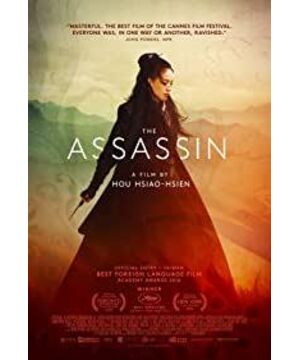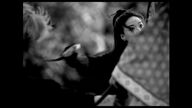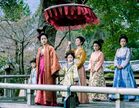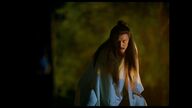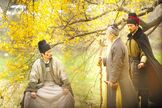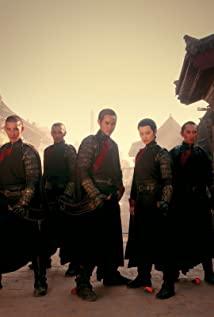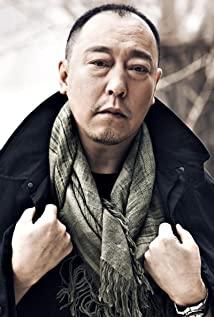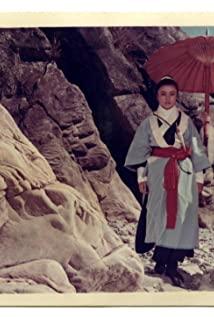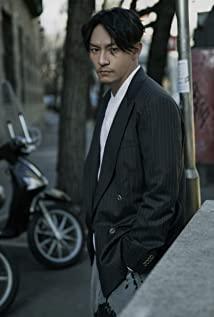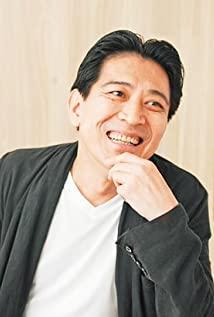It's not just because I fell asleep twice in the middle, such as the chat scene that was repeatedly praised by countless film critics—Tian Ji'an told Hu Ji a story, and Nie Yinniang was listening in front of the camera. It's really beautiful, but I can't help it. Another example is the night scene after the mirror grinding man appeared on the stage. I fell asleep in the blurry flames again... The reason why I feel bad is because I am looking forward to this movie. The movie of the year (2009-01-09 I marked "want to watch"!) was completely aphasia, yes, it was aphasia, the kind of aphasia that was completely speechless.
In fact, since I watched an interview with Abbas and said, “It’s a good thing to fall asleep watching my movie, the world is so messy now, you have to thank me for being able to sleep for a while”, I never fell asleep while watching a movie. There is no psychological pressure anymore. I slept when watching Tarkovsky, Rohmer, Angelopoulos, Fellini, Bergman and even Woody Allen, and when I watched "Batman", "Superman" and "The Hunger Games" So it’s not surprising that I fell asleep when I watched Hou Xiaoxian. The last time I got up in the morning and watched "A Dream of Life", I slept from beginning to end... , It is inevitable to take a nap.
My first thought after watching it was that this movie is going to kneel at the box office. What I immediately remembered was the famous story of "The Tree of Life", saying that a notice was posted in the theater, to the effect that although Brad Pitt and Sean Penn were included in the film, it was a very high-end art film. Therefore, please be cautious when buying tickets, do not make unreasonable trouble if you don’t understand, tickets sold will not be refunded. It feels like "Nie Yinniang" can be done in the same way. Then I remembered that Director Hou had said many times that his films had to be "low-density and long-term" to arrange the film, "if it is released on the whole island, the film will be released in three days", Zhu Tianwen wrote in an article as the producer To say "Hou Xiaoxian is a cash cow" is also about the so-called ten-year return of art theaters. But the question is, how can there be any theaters in mainland China that are willing to do it, or can it achieve this kind of "low-density and long-term"?
So I joked that this film has to be distributed like this: the ticket price is 200, the purchase is limited, and if you want to grab it, it is only once a week. Hunger marketing, keep the ones that you don’t understand, and blow them out. After the blow, I silently make up the lesson, grab the ticket and read it again...
The second thought was that after ten years of filming, Dao Hou went so far that he didn't know him anymore.
This is my worst point. Ordinarily, based on my understanding of Hou Dao's work and its interpretation, I would not fail to understand it. It took me about two years to sort out all of Director Hou’s works, related works and related documents. I have watched 7 works on the big screen, several of which have been watched more than 20 times, and I have listened to five lectures by Director Hou. Six games (Do you know that Director Hou particularly likes Xin Haicheng's "5 Centimeters Per Second"?), the seminar was held once, and I read almost 10 monographs, and Director Hou has watched a lot of movies about his disciples and grandchildren... In short, from audio-visual language to the structure of the play, from cultural analysis to ideological criticism, I am barely familiar, but these are completely difficult to meet with "Nie Yinniang".
Because watching "Nie Yinniang" is simply a shocking experience.
It's not that my understanding of Hou Dao has been stuck in a few divine works in the 1980s. Although "My Childhood" and "Lian Lian Feng Chen" are indeed the best introductory teaching materials for a certain art film, they are also works that will get better and better in the days to come; however, Hou Dao from 80 From his fame to the present, he has chosen the most dangerous path. In his own words, he is "I can't go back here" on the one hand, and "back to the audience" on the other. Not to mention political and historical themes, contemporary themes like "The Journey of the Red Balloon" have to be seen the third time to see it; "Coffee Time" can only be understood after completing Ozu's research. Ozu had to take the lead for a hundred years. What makes me anxious is that, while hiding the narrative, Hou once again overturned his audiovisual language system (fortunately, the material shot with Bolex was not cut in!). This is probably because the film critics have not yet awakened. The reason for this is whether it is dependent on the path of Hou Dao’s previous works, or that film critics are still hesitant to find a suitable explanation of Hou Dao. There are probably quite a few viewers who just want to complain after watching it, but are frightened by Hou. Leading prestige, had to doubt his IQ.
That's right, if you don't understand, you have to go back to study and watch movies, do your homework and come back. Hou Xiaoxian's movies do not happen every day.
So I went to watch another show when it was released on the 27th. On Thursday afternoon, it turned out to be almost full. There was no one chatting or calling and no children crying during the movie, and there was the illusion of being in an art theater in a trance. This time I fell asleep again, and my sleeping point was when Nie Yinniang came home and the maids were preparing to take a bath. I felt refreshed when I woke up, and then I suddenly understood.
This time I think how can this movie be so good.
Really, the editing points are accurate to almost a second, and they are just right everywhere; the story is clear and bottomless, there is nowhere to understand...Many film critics are right, because they didn't understand it before because of thinking too much. This is like the experience of reading an online novel with a few million words and reading a Tang novel with a thousand words.
The film is still based on Hou’s usual subtraction. The so-called "Just leave the story, delete the plot", Hou himself likes the iceberg metaphor, but if "Nie Yinniang" is an iceberg, probably the part on the water is only 100%. One... The challenge to the audience is that this is obviously something that can’t be filled out (such as the history of instant noodles in "Coffee Time"). It is a must in the general or even most sense. I don’t want to pave the way for the action scene props by expressly suggesting dialogue. Director Hou doesn’t want them here. Those are just "settings" for the actors. What Director Hou wants to leave are "qiyun" and "cloud blocks" (Liao Qingsong) , Is a "model" (Bressonian), and the final result is really "Yoshimitsu Kataba"!
As for the audiovisual, my impression is that Director Hou has completely made the "logic of photography"/"logic of gaze" this time. I still remember the bookstore scene in "Coffee Time" and the goddess ratio in "Travel with Red Balloons". Nosh's long driving scene, it doesn't matter what the scene is doing, just watching the graceful capture of the light is already drunk. Did you see that Director Hou shot the "wind"? Have you ever seen any movie in such a style? You can see the flow of air in almost every scene, the clothes are fluttering, the gauze curtain reflects the candlelight, the fog in the mountains, the flames and smoke in the hut when it is backlit...These things are fast-paced editing. Have you arrived? Do you hear the exquisite and full sound effect? Do you still pay attention to the sound of wind and insects in those movies?
Slowness and simplicity are really superficial. Below this is the story of abandoning the plot, the bloody palace fight (house fight?), the love that still wants to talk about it, and the extremely difficult choice. Director Hou wrote that Nie Yinniang did not kill Tian Ji'an. There is no logic at all, but with a kind of unspeakable loneliness, and all this is not only the emotions of children, but also the consideration of the big age, and this is only used How much pen and ink! It was so much higher than the nameless not killing King Qin, I don't know where.
Is Hou Xiaoxian trying to rebuild a space in the late Tang Dynasty? Obviously not all. "Flowers on the Sea" rebuilt a Shanghai in the Republic of China. The interior scene was perfect, but the exterior scene was always out of the painting. The change in "Nie Yinniang" was that Dao Hou finally stepped out of the house and entered the landscape. Once the space opened, the weather suddenly changed. Perhaps important, it is indeed the landscape. This has its own space for ideological criticism (for example, the person who took Nie Yinniang away from the mirror was a Japanese craftsman sent to the Tang Dynasty), but this is actually not important. It is the landscape stared by the characters in the play. Therefore, in my opinion, rather than saying that Hou Xiaoxian is reappearing a kind of "late Tang gaze", it is about how people look at each other, how people look at mountains and rivers, and how people look at time.
Finally, tell the truth. The audience who had watched it scored a star rating and laughed at the special effects of 50 cents, not knowing where the 90 million was spent. The picture is almost broken, what level of director Hou Dao is, do you think he can't play with Wia? The problem is that when the audience expecting at least one piece of "The Grand Master" enters the theater, after seeing such a film, ninety-nine percent of the audience will probably not feel that something is wrong with them, but that there is something wrong with the film. This is the "shock experience" I mentioned earlier. "Nie Yinniang" is completely inconsistent with the current common sense of movie viewing. Everything that commercial films consider important is nothing at all in Dao Hou. This is also the important point of Dao Hou in the world's film history: In today's era, we can still create film language and have always been committed to it. This seems to have been said many times, but "Nie Yinniang" here, is it comparable to some so-called art films of opportunism?
Even so, Nie Yinniang’s return to her seclusion does not seem so simple: the audience or "type" is like the master in the text, looking forward to one or a few beautiful martial arts scenes, even more blood and more deaths. ; But not. Probably many viewers never feel that watching a movie requires long and arduous learning, never feel that watching a movie requires brainstorming, and never feel that watching a movie can provide a higher level of spiritual pleasure in addition to being cool. Well, now that there are types and audiovisual languages that work well and can be copied and reproduced, why bother to think about other thankless ways? "Nie Yinniang" is of course provocative of the audience. Director Hou must turn his back to the audience, so he can naturally bear this loneliness. Just a little sorry for him.
So today I went to watch it a third time.
*This article is titled "Watching Hou Xiaoxian's movie and I am not ashamed to fall asleep". Tencent Entertainment 2015-08-29 07:49 http://ent.qq.com/a/20150829/009860.htm
View more about The Assassin reviews


